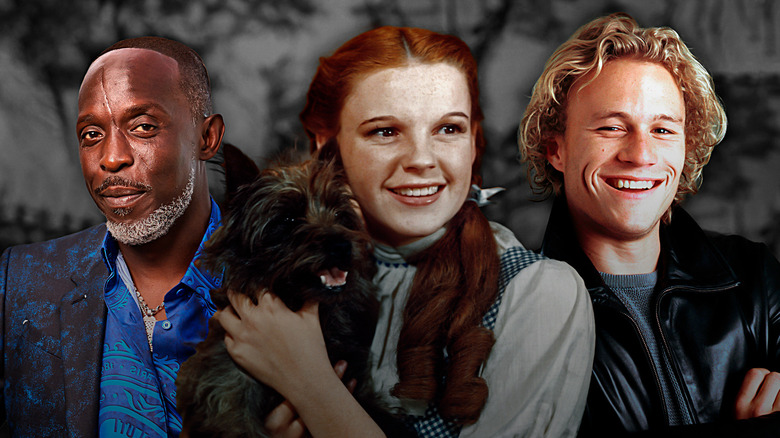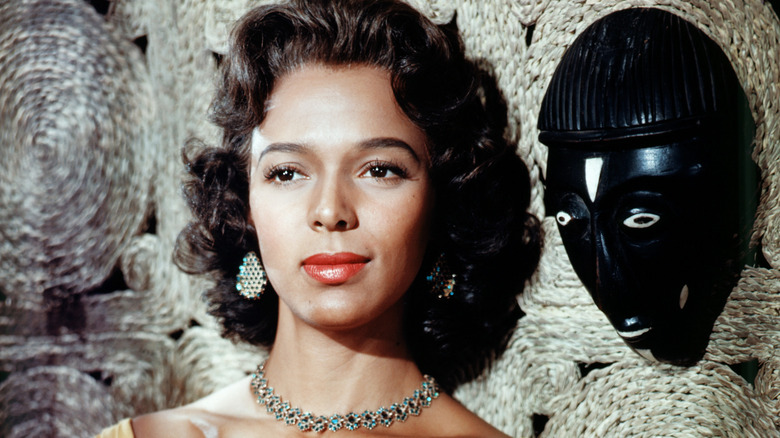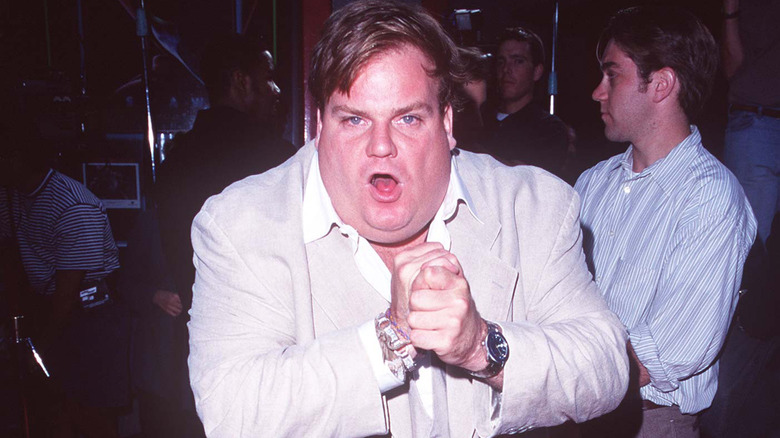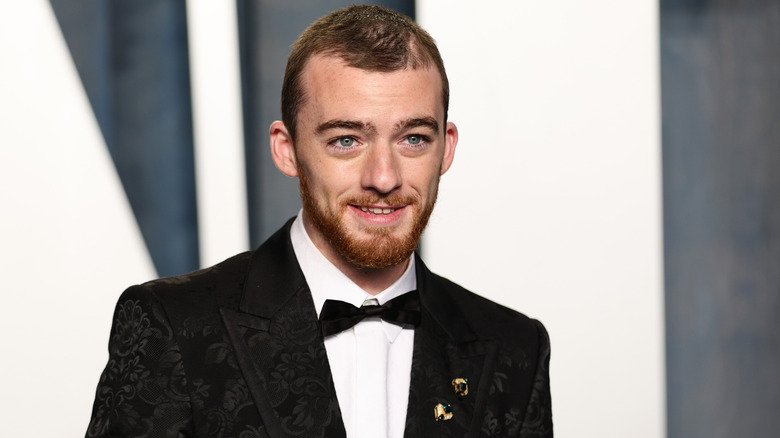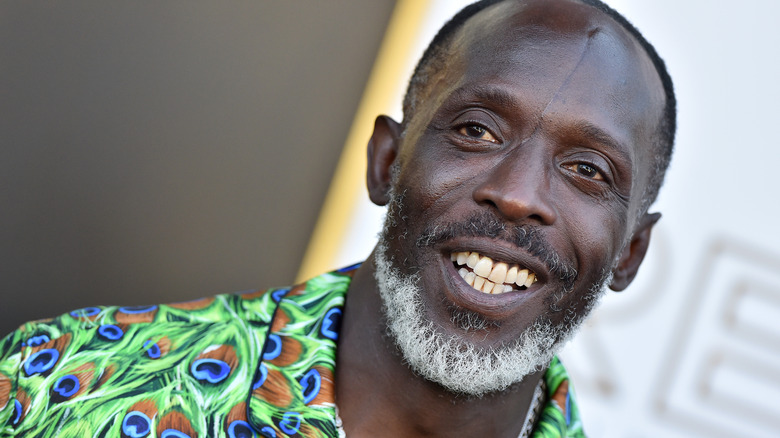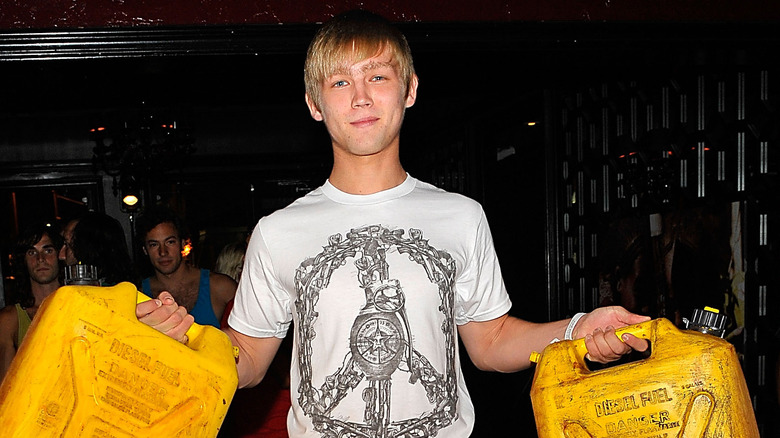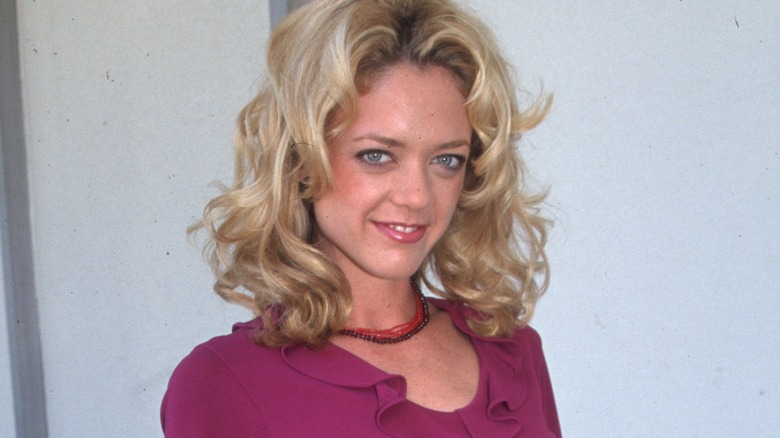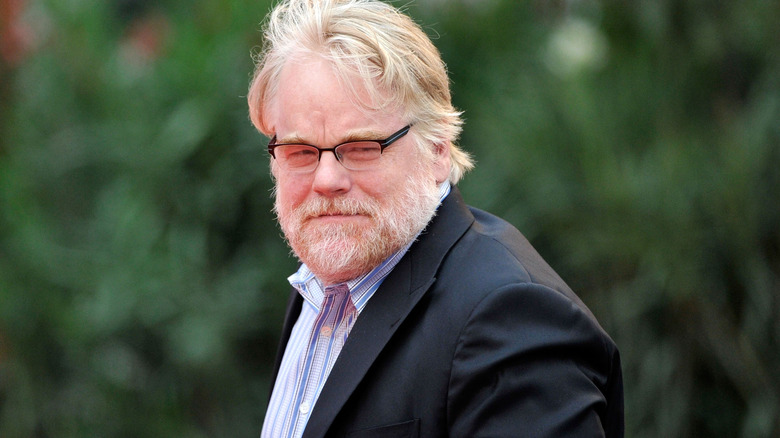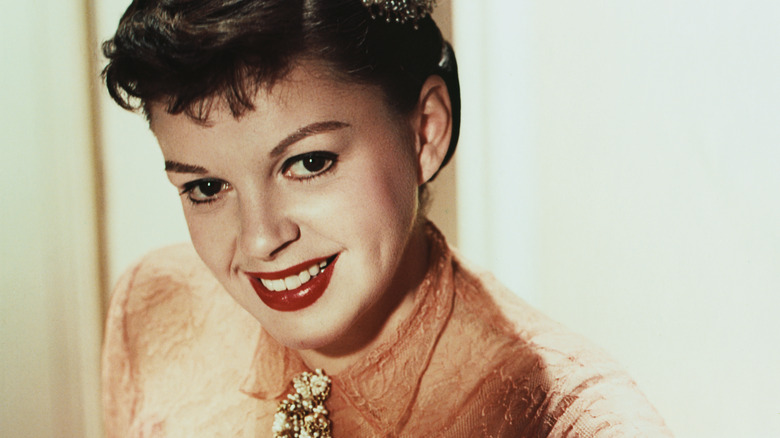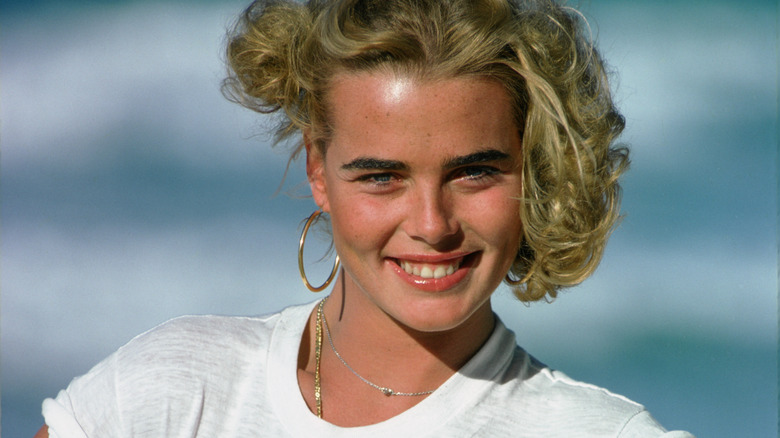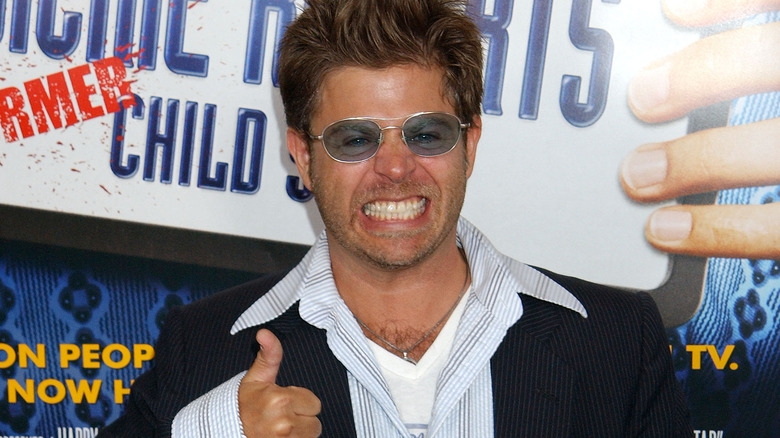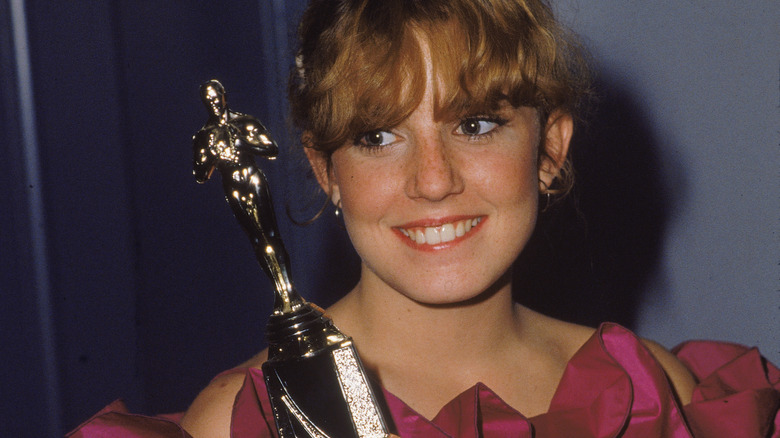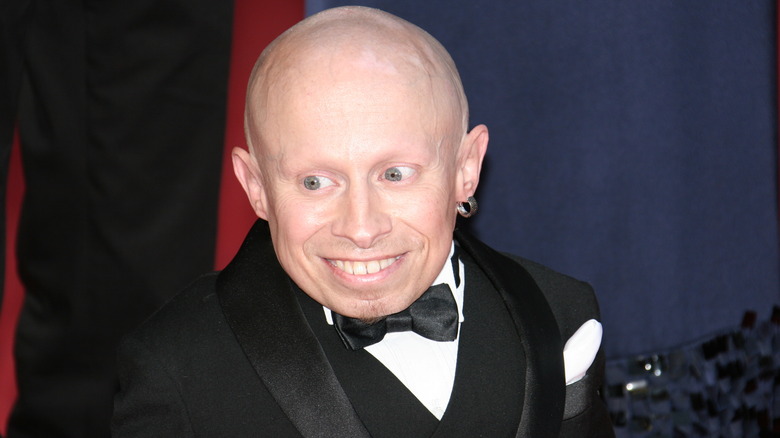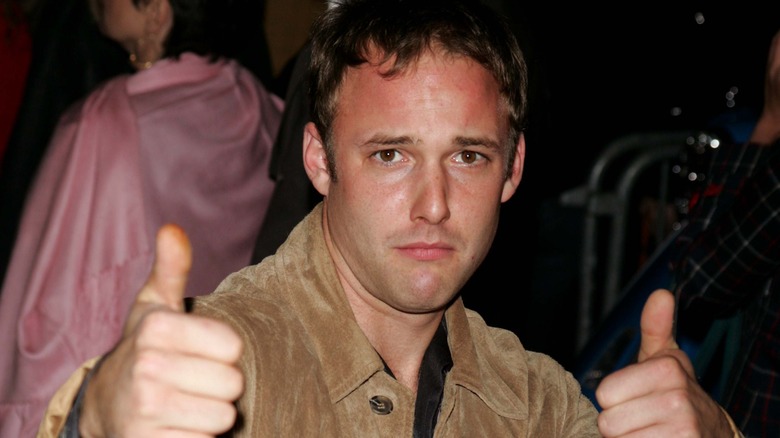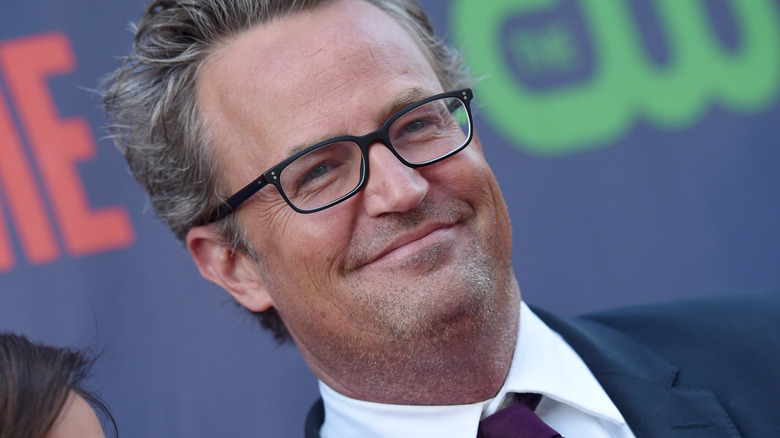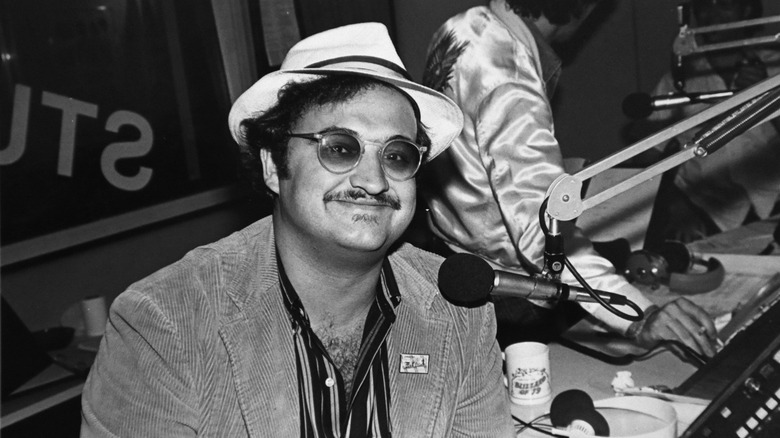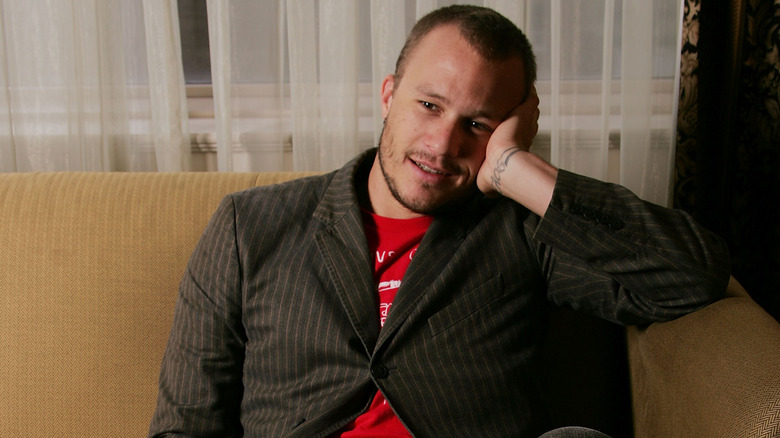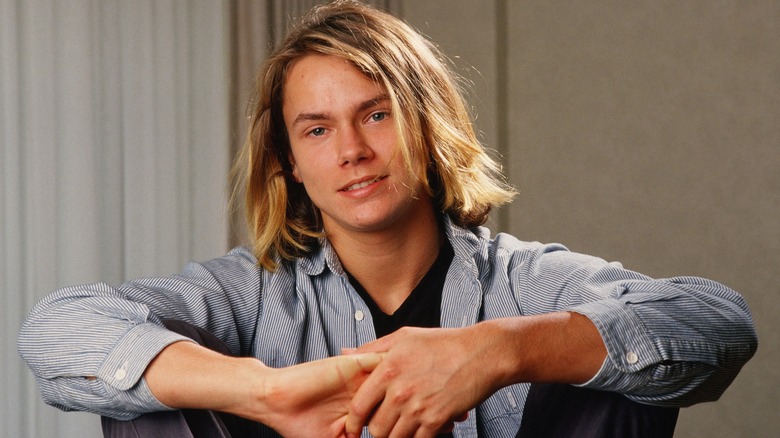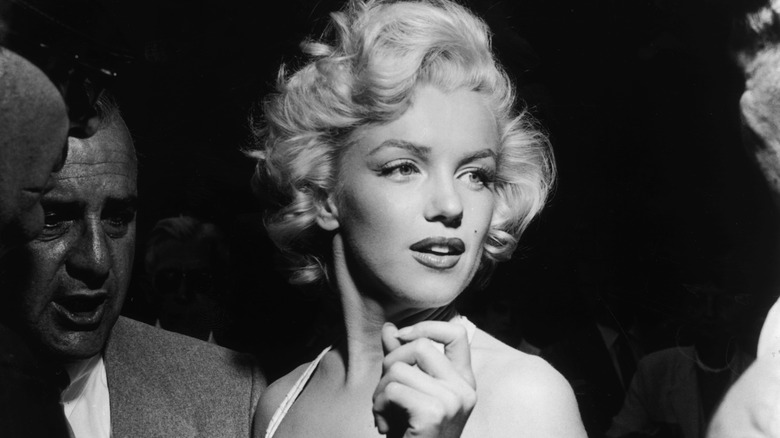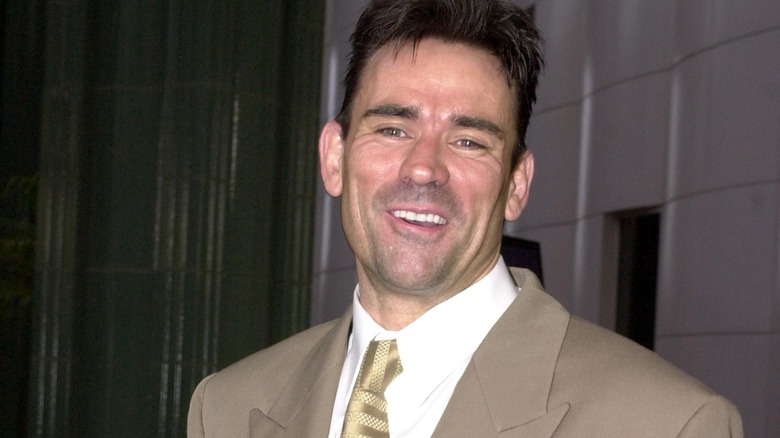Actors Who Tragically Passed Away From Overdoses
The following article contains discussions of drug and alcohol abuse.
Hollywood is almost like another world, a city of bright lights, brighter stars, and extraordinary excess that could feel alien to everyone else. For some, though, it's that excess that attracts aspiring talent, drawn to the promise of the glitz and glamour, and the fame and fortune that a successful acting career can bring. But for some, that excess leads to troubling addictions. Whether it's the allure of the industry's vibrant nightlife or a momentary escape from the rigors of fame, many actors turn to drugs and alcohol as coping mechanisms. And many haven't survived.
While the passing of a beloved actor typically elicits sadness and even grief from fans, some of the most difficult passings to handle are those who lost their lives to drug abuse or alcohol misuse because it often seems completely senseless and avoidable. And they're all the more shocking because the private struggles of many actors remain hidden from the world until the day they lose their lives. In the history of Hollywood, this has happened all too often, affecting everyone from lesser-known character actors to the biggest movie stars. From the earliest days of cinema to the present day, this is a list of beloved actors who tragically died due to overdoses.
Dorothy Dandridge
Cleveland native Dorothy Dandridge was something of an unlikely star, an African American woman who grew up in the middle of the Great Depression. As a singer and dancer, she found success and forged a career alongside her sister Vivian as The Wonder Children, and together they played famous nightclubs and worked with high-profile acts like Cab Calloway. When they moved to Los Angeles, she became a movie star.
She started with small parts before moving into leading roles, and Dandridge's career is dotted with all-time classics. Though she got a strong start in the 1930s and '40s, the 1950s saw her starring in films like "Carmen Jones" and "Porgy and Bess." Thanks to the former, Dandridge became the first African American person nominated for an Academy Award for a leading role, making her not just a trailblazing Black icon, but a revolutionary in Hollywood. Then, at the height of her fame, Dandridge died.
It happened on September 8, 1965, when her manager, Earl Mills, couldn't get in touch with her. Using a tire iron, Mills broke down the door to Dandridge's apartment to find her dead, the result of an accidental antidepressant overdose. Dandridge left behind a towering legacy. Decades later, she was played by Halle Berry in her breakout role in the 1999 television movie "Introducing Dorothy Dandridge."
Chris Farley
In the early '90s, "Saturday Night Live" saw the introduction of bright young comedians like Mike Myers, Adam Sandler, and Molly Shannon onto the prime-time stage. But at the center of it all was Chris Farley, whose wild-eyed persona became the stuff of legend. He alone was often reason enough to tune in, and he became the de facto star of the show for many. But within just a few short years, Farley was on the outs, dumped from the cast alongside Sandler and others after the 1995 season.
Many feared that with a lifestyle that involved copious partying, frenzied alcohol consumption, and wanton drug use, Farley was destined for a downfall. And those fears were confirmed after a disastrous 1997 return to "SNL" as guest host where a meta sketch about Farley's alcohol abuse and wild ways was a genuine cause for concern. The star comedian seemed visibly out of sorts during his appearance, too, often so out of breath that "Weekend Update" host Norm Macdonald joked that he needed extra rest between sketches. On movie sets around the same time, Farley became famous for his excess — both in terms of drugs and alcohol as well as his searing temper, and co-stars and filmmakers were often forced to intervene.
In and out of rehab during his final months, Farley's death stunned the comedy world. Just months after a fateful Playboy interview where he joked about his poor health, his trouble with drugs, and his impending death, Farley died from a fatal overdose, a toxic mixture of cocaine and morphine.
Angus Cloud
Angus Cloud was a rising star in Hollywood. He scored a hit with his first role, in the HBO drama "Euphoria" alongside fellow emerging stars Zendaya and Jacob Elordi. In "Euphoria," Cloud received praise for his gripping performance as the drug dealer Fezco. Cloud's future seemed limitless, and it wasn't long before he hit the movies with a role in Ethan Berger's 2023 film "The Line" and the starring role in the crime drama "Your Lucky Day." But that same year, the 25-year-old Cloud's life came to a shocking end.
A coroner's report two months after his passing revealed the cause of Cloud's death to be an unintentional overdose of cocaine, methamphetamine, fentanyl, and benzodiazepines. "It is with the heaviest heart that we had to say goodbye to an incredible human today," said Cloud's family in a statement. "We hope the world remembers him for his humor, laughter and love for everyone." Fans of Cloud will have at least two more chances to celebrate his life and talent, though, as he reportedly completed filming an untitled Universal Monsters movie and the upcoming Pedro Pascal film "Freaky Tales."
Michael K. Williams
There are plenty of actors who are identified by a single role, but few are as acclaimed as Michael K. Williams. Though his career got its start in the late 1990s, it was a certain show on HBO in 2002 that made his career: David Simon's Emmy-nominated "The Wire." There Williams played the iconic Omar Little, a criminal folk hero whose mix of devilish charm and ruthless application of his own moral code made him a favorite of audiences.
Following that breakout role, Williams' career exploded, though he could never quite match his success as Omar. Still, later roles on "Community" and "Lovecraft Country" proved his versatility. Williams even found success in movies like "12 Years a Slave," the "RoboCop" remake, and "Assassin's Creed" among others.
In September 2021, Williams' body was discovered by his nephew at home in Brooklyn. The autopsy report released later stated the actor's death was due to a deadly mixture of cocaine, fentanyl, heroin, and p-fluorofentanyl. Four men in New York were arrested and charged in connection to Williams' death. One of the men was sentenced to two and a half years of prison time.
Evan Ellingson
Evan Ellingson started in show business appearing in episodes of "General Hospital" and "That Was Then." Around that time as a child actor, he also became known for playing the 10-year-old version of Christopher Titus in his eponymously titled sitcom "Titus."
As a teenager, Ellingson had a career playing the son of leading characters, first starring in the short-lived comedy "Complete Savages" as the son of firefighter patriarch Nick (Keith Carradine) before he snagged the part of Josh Bauer — son of Jack (Kiefer Sutherland) — on "24" in 2007. Later that same year he joined the cast of "CSI: Miami" in a recurring role as Kyle Harmon, the son of David Caruso's character, Lt. Horatio Caine. This would turn out to be Ellingson's final role, as he stepped away from acting when he reached adulthood. The one-time child star left Hollywood and later struggled with addiction, problems recognized by his father, Michael, following his passing in 2023.
Ellingson's death came just months after his 35th birthday when he was living in a sober-living facility. According to official reports, his death was caused by an accidental overdose of fentanyl.
Lisa Robin Kelly
There were few bigger sitcoms in the late '90s and 2000s than "That '70s Show," a series that turned the nostalgia and wildness of hippie culture into big laughs. The series turned Topher Grace, Mila Kunis, and Ashton Kutcher into superstars, but their co-star Lisa Robin Kelly left the role of Eric Forman's sister Laurie midway through the series.
Years after leaving "That '70s Show," Kelly admitted that her struggle with alcohol had contributed to her departure. During an interview years later, Kelly said she'd turned to alcohol after losing a baby in a miscarriage but was working to turn her life around. Kelly was arrested in 2012 on a felony charge of corporal injury upon a spouse, but the district attorney didn't press charges. She was arrested again a few months later and charged with assault alongside her husband. She was arrested a year later on a DUI charge.
Kelly checked into a rehab facility — Pax Rehab House in Altadena, California — after her DUI arrest in 2013, but she died in August that year. A coroner's report unearthed evidence that she'd died in her sleep due to drug intoxication.
If you or someone you know is dealing with domestic abuse, you can call the National Domestic Violence Hotline at 1−800−799−7233. You can also find more information, resources, and support at their website.
Philip Seymour Hoffman
A character actor of the highest caliber, Philip Seymour Hoffman opened his career with small roles in early '90s films like "Leap of Faith" and "Scent of a Woman." Larger supporting roles followed in "Twister," "Boogie Nights," and "The Big Lebowski" before he hit it big in the early 2000s, starring as reporter Freddy Lounds in the 2002 re-adaptation of "Red Dragon," taking over the role from Stephen Lang, who played the part in the original 1986 version, "Manhunter."
From there, Hoffman's star rose like a rocket, leading to his playing the title role in the 2005 biopic "Capote." The film dramatized author Truman Capote's investigation into a serial killer that led to the writing of the 1965 crime classic "In Cold Blood," and Hoffman's performance was a big reason it was a hit. His performance earned him an Academy Award for Best Actor. The only logical move Hoffman could make now was to face off against Tom Cruise, which they did in "Mission: Impossible III."
Some of his biggest roles were still to come, though, including his part as Plutarch Heavensbee in the "Hunger Games" films. Before he could finish his final appearances as that character in the third and fourth installments, however, Hoffman suffered a fatal drug overdose and was discovered dead in his New York apartment, with a needle still in his arm and a number of drugs in his system including heroin and cocaine. The last two "Hunger Games" films with Hoffman were released posthumously.
Judy Garland
Parade Magazine once called "The Wizard of Oz" the "World's Favorite Movie," and there are good reasons why. Not only was it one of the biggest movies of its era, but it's since become an enduring classic that has been beloved for decades around the world, continually watched and celebrated by new generations — and it made star Judy Garland a household name. Her rendition of "Somewhere Over the Rainbow" made her an instant singing star too, and she quickly became one of Hollywood's brightest entertainers even though she was barely 17 when the film was released. "Oz" was hardly Garland's only success, though. After a string of musical hits, she achieved more recognition when she led "A Star Is Born," for which she was nominated for an Academy Award.
Behind the scenes, her Hollywood story wasn't what it seemed, as she alleged that the studio Metro-Goldwyn-Mayer supplied its young stars with amphetamines during the day to keep them active and gave them barbiturates at night to make them sleep. Coupled with frequent drinking and other drug use, Garland developed major problems later in her career. Though Garland rebounded after "A Star Is Born" and her star began to rise again, her career didn't remain on the rise for long. Her drug and alcohol problems persisted until 1969, when she was found dead in her home from an overdose of barbiturates. She was just 47 years old.
Cory Monteith
Getting his start in an episode of "Stargate: Atlantis" in 2004, actor Cory Monteith built a strong career with guest spots on favorites like "Supernatural" and "Smallville," and even another role in "Stargate SG-1." Movies followed the young actor, with an appearance in "Final Destination 3" being a career highlight before he secured a recurring role on the sci-fi teen drama "Kyle XY." In 2009 he landed his career-defining role — joining the main cast of "Glee," which quickly became one of the hottest shows on television. On "Glee," Monteith played glee club member (and former athlete) Finn Hudson, a role he played for the show's first four hit seasons. It even led to a guest-starring role as himself on an episode of "The Simpsons," a sign that he'd truly "made it" in Hollywood.
From an early age, the actor had been plagued by problems with drugs and alcohol, entering rehab when he was just 15 and again when he was 19. During his days on "Glee," Monteith often talked publicly about his struggles. In 2013, Monteith was still seeking treatment for substance abuse. He was found dead in a hotel room in Vancouver. An autopsy revealed that he'd died of an overdose of heroin, combined with toxic levels of alcohol.
Margaux Hemingway
In the 1980s, Margaux Hemingway was as hot a supermodel as there was. But Hemingway — the granddaughter of renowned writer Ernest Hemingway and sister of actor Mariel Hemingway — also dabbled in acting and had a string of film roles the same decade following her debut starring role in the revenge thriller in "Lipstick" with Anne Bancroft and the Italian horror film "Killer Fish."
What fans of the model-turned-actor may not have realized, though, is that throughout her diverse career, Hemingway was also struggling with myriad personal problems. In addition to suffering from epilepsy, Hemingway also dealt with mental health struggles that included bouts of severe depression as well as an eating disorder. She also struggled with alcohol misuse. With an excess of phenobarbital, Hemingway took her own life in July 1996.
If you need help with an eating disorder, or know someone who does, help is available. Visit the National Eating Disorders Association website or contact NEDA's Live Helpline at 1-800-931-2237. You can also receive 24/7 Crisis Support via text (send NEDA to 741-741).
Adam Rich
Child stardom can take a heavy toll on actors. Nowhere is this more horrifically visible than the case of Adam Rich, a young actor who came to fame off the back of the 1977 sitcom "Eight Is Enough." There he played Nicholas Bradford, the youngest son of Tom, played by the legendary TV star Dick Van Patten. Rich was barely 9 years old when he was cast in the part, and he grew up on screen during the show's five years on the air.
As Rich got older, though, the rapid rise to fame led to numerous personal problems. He had multiple stints in rehab facilities as he suffered from drug abuse and alcohol abuse. He was in and out of handcuffs for years, too, including a 1991 arrest for attempted burglary and an incident in which he tried to shoplift at a West Hills pharmacy in Los Angeles. That same year, he was arraigned on drug possession charges. In 2002, he was back in trouble again, arrested and suspected of driving under the influence after he drove his vehicle down a closed stretch of highway.
The troubled actor, in and out of rehab for most of his adult life, died in 2023 at the age of 54. The autopsy report said the cause was an accidental overdose of fentanyl.
Dana Plato
Another child star from the late '70s and early '80s, Dana Plato was best known for her role as Kim Drummond on the smash hit "Diff'rent Strokes" which ran from 1978 to 1986. But even that role came to her after she'd proven herself in the 1978 comedy "California Suite." By the time the '80s came to a close, though, Plato's TV days were all but done, with the final episode of her hit sitcom being her last appearance in a network series. Afterward, she struggled to regain her fame, appearing in a string of B-movies and X-rated films. She posed for Playboy in 1989.
Like Adam Rich, the stardom she found in adolescence and her fall from grace led to problems with drugs and alcohol and landed her in the back of a police car on a number of occasions. She was once arrested in 1991 for robbing a video store in Las Vegas and again in 1992 after she forged a prescription for drugs. Plato died in May 1999 while visiting her fiance's parents, overdosing on a combination of painkillers and valium.
Verne Troyer
Verne Troyer's career started far before his star-making role as Mini-Me in "Austin Powers: The Spy Who Shagged Me." Many of his early roles saw him buried underneath costumes and make-up in movies like "Jingle All the Way," "Men in Black," and "Wishmaster," but he had more visible roles in "Fear and Loathing in Las Vegas" and his role in the short-lived UPN comedy "Shasta McNasty."
After playing Mini-Me, though, Troyer became a favorite in the comedy world, and roles in "Bubble Boy" and "Pauly Shore Is Dead" followed. He even played a small role as Griphook in the first "Harry Potter" movie — a rare American actor in the notoriously all-British series.
Troyer also dealt with health issues for his entire life due to a rare form of dwarfism that, combined with alcohol abuse, contributed to his death in 2018. The 49-year-old actor suffered alcohol intoxication and was hospitalized not long before his death, which was officially declared to be the result of suicide.
If you or someone you know is struggling or in crisis, help is available. Call or text 988 or chat 988lifeline.org
Brad Renfro
Brad Renfro got his start as a child actor with a small role in Joel Schumacher's courtroom thriller "The Client," but as he got older he took on starring roles. Renfro's most notable film is "Apt Pupil," the film that turned director Bryan Singer into a Hollywood darling. There he starred opposite Ian McKellen as a naive high school student who learns that his elderly neighbor is a surviving Nazi officer. But just as he was coming into his own, Renfro's life became a tangled web of substance abuse and run-ins with the law, beginning as a teen when he was charged with drug possession. Several more arrests followed, including a charge of grand theft in 2000, and his famously nasty attitude toward movie critics didn't help matters.
Renfro's struggles had a major effect on his career, as major movie roles began drying up. In 2007, while on probation, he failed to enter a drug treatment program as instructed, which could have saved his life. Ultimately, less than a year after being scolded by the court, Renfro was found dead of a drug overdose after spending the night with some friends, who discovered him unconscious the following morning. He was just 25 years old.
Matthew Perry
Best known to audiences for his decade-long stint at Chandler Bing on "Friends" beginning in 1994, Matthew Perry first broke into acting on the small screen years earlier. In the '80s, Perry had a recurring role in "Growing Pains," and his first leading role was in "Boys Will Be Boys." Following "Friends," though, Perry also had success with runs on "The Odd Couple" and "Studio 60 on the Sunset Strip." Beyond TV, he had a few modest movie hits, most notably the Bruce Willis-led comedy "The Whole Nine Yards." He also co-starred with Chris Farley in the actor's final film, "Almost Heroes."
Unfortunately, Perry's steady career on screen stood in stark contrast to his tumultuous personal life. First exposed to alcohol years before he even turned 18, he eventually found himself in the throes of addiction. He also developed a drug addiction when he was prescribed Vicodin after a jet ski accident in 1997. His drug and alcohol abuse eventually impacted his work on "Friends," forcing his costars to intervene.
Plagued by addiction for much of his life — which saw him in and out of rehab numerous times — Perry finally seemed to be taking a turn for the better in 2022, when he claimed in a newly published memoir to have finally been sober for over a year thanks to plenty of effort and a hefty sum of some $9 million. But tragically, almost a year to the day later, Perry was found dead at the age of 54 on October 28, 2023, with his passing partially attributed to opioid usage and an overdose of ketamine.
John Belushi
Remembered as one of the founding cast members of the iconic sketch comedy show "Saturday Night Live," John Belushi began his career on stage, quickly emerging as one of the decade's most promising comics. It was his time on both the stage and on "SNL" that led to two of his best-received movies, "National Lampoon's Animal House" and "The Blues Brothers." And despite a minor career slump following the release of the latter, it's entirely possible Belushi would have rebounded and continued in Hollywood for decades to come. Unfortunately, his memorable career was cut short in early 1982, the result of an ongoing drug addiction and a shocking manslaughter case that left Belushi dead.
Belushi was found dead in a Hollywood hotel, the Chateau Marmont, where he had been staying. He was 33 years old. Though his untimely death was initially ruled to be an accidental drug overdose, subsequent information in the wake of his passing implicated drug dealer Cathy Smith for injecting him with the cocaine and morphine mixture that killed him. She was later found guilty and served 15 months in prison.
Heath Ledger
Born in 1979, Australian actor Heath Ledger's road to becoming one of the most popular actors in Hollywood was already in motion by the early '90s, when he got his start acting in smaller roles in the land down under. But by the turn of the millennium, he had not only gained fame and acclaim in his native Australia but in the United States as well, thanks to his leading role as Patrick Verona in the 1999 teen comedy "10 Things I Hate About You."
The 2000s were looking to be a definitive decade for Ledger, now in his 20s, as he went on to star in Oscar-nominated films such as "The Patriot" and "Brokeback Mountain," a title that garnered him a Best Actor nomination. In 2007, production began on the second Christopher Nolan-led "Batman" film, with Ledger cast to play the caped crusader's most infamous nemesis, the Joker. There was outrage online. Many fans of the franchise were livid that the star of teen dramas and rom-coms was playing the iconic Batman villain. But once the movie was released, Ledger's take on the character immediately became the definitive version, the Joker all other live-action Jokers were measured up against. It was an Oscar-winning performance, but Ledger didn't live to see the acclaim.
On January 22, 2008, Ledger was found unresponsive at his apartment in New York City. Not long after, he was pronounced dead, with later reports revealing that the Australian-born actor suffered a fatal overdose by way of a prescription drug cocktail at just 28 years old.
River Phoenix
River Phoenix got his big break in Hollywood when he was a child, first appearing as one of the stars of the Joe Dante-helmed "Explorers" alongside a young Ethan Hawke. Within a few years, Phoenix was headlining the cast of the Stephen King adaptation "Stand By Me" in 1986, and not long after was the actor chosen to play a younger version of Harrison Ford's whip-wielding relic hunter in the 1989 classic "Indiana Jones and the Last Crusade." In his 11 years of screen acting, he also scored an Oscar nomination for his role in 1988's "Running on Empty."
By the early 1990s, it seemed like the sky was the limit for Phoenix, who continued to impress on screen in the tear-jerking drama "My Own Private Idaho" and the ensemble comedic thriller "Sneakers." He had just been tapped to star in Neil Jordan's 1994 adaptation of "Interview with the Vampire" when tragedy struck.
In perhaps one of the most shocking deaths to rock Hollywood in decades, the actor's younger brother, Joaquin, made a frantic call to emergency services in the early hours of Halloween 1993, claiming that River was having seizures. Phoenix was unresponsive when emergency personnel arrived and was declared dead when he arrived at the hospital. Toxicology reports blamed his death on a mixture of cocaine and heroin. Phoenix was replaced by Christian Slater in "Vampire," which is dedicated to his memory.
Marilyn Monroe
In her heyday, there was nobody more famous in Hollywood — or arguably the world — than Marilyn Monroe. Born Norma Jeane Mortenson, she embarked on a modeling career in the 1940s and became a sex symbol practically overnight. Known for her playful attitude, curvaceous figure, and long flowing locks, Monroe's name and likeness became synonymous with beauty and glamour.
Making her first on-screen appearance in the 1947 film "Dangerous Years," Monroe was often cast as the flighty, spunky blonde bombshell, the kind of role she was born to play. In the 1950s she hit it big with hits that include "Gentlemen Prefer Blondes," "There's No Business Like Show Business," and "The Seven Year Itch." As one of the most famous women of her day, Monroe starred alongside the biggest male leads in the business including Cary Grant, Clark Gable, and Laurence Olivier. Monroe was known for her relationships with huge stars, too, including her brief marriage to New York Yankees slugger Joe Dimaggio, as well as rumored affairs with John F. Kennedy and Marlon Brando.
On August 5, 1962, though, Monroe was discovered dead by her housekeeper and her psychiatrist. She had taken a lethal overdose of barbiturates. Though some may have suspected an accidental overdose, Monroe's death was officially deemed a suicide. Her final completed film was the 1961 classic "The Misfits," written by her then-husband, Arthur Miller.
If you or someone you know is struggling or in crisis, help is available. Call or text 988 or chat 988lifeline.org
Trevor Goddard
Born in London, Trevor Goddard spent much of his early days pursuing a career in music. In the 1970s and '80s, he tried his hand at the British punk scene but eventually turned to acting full-time in the 1990s. Though his career got its start playing supporting roles, he did get to play Kano in the 1995 cult classic "Mortal Kombat." A handful of hits followed, with Goddard landing roles in "Gone in 60 Seconds" and "Deep Rising," but much of the decade was spent guest-starring on television. There he played parts in episodes of "The Commish," "Murphy Brown," "Baywatch," and "Murder, She Wrote."
It was in 1998, though, that Goddard got the break of his career, playing Lt. Cmdr. Mic Brumby in four seasons of the military courtroom drama "JAG." Just when he had hit the big time, though, Goddard was struck with a litany of personal problems, including a difficult divorce that some suspect may have contributed to him taking his own life in 2003.
Found dead in his Los Angeles home, the final verdict wasn't suicide, though, but an accidental drug overdose, with the autopsy report revealing a combination of heroin, cocaine, and other drugs in his system. He was 40 years old and left behind an ex-wife and two children. Until his death, he had convinced nearly everybody, including the newspapers reporting on his passing, that he was an Australian native, born in Perth. His father cleared up the tall tale at Goddard's own funeral.
If you or anyone you know needs help with addiction issues, help is available. Visit the Substance Abuse and Mental Health Services Administration website or contact SAMHSA's National Helpline at 1-800-662-HELP (4357).
